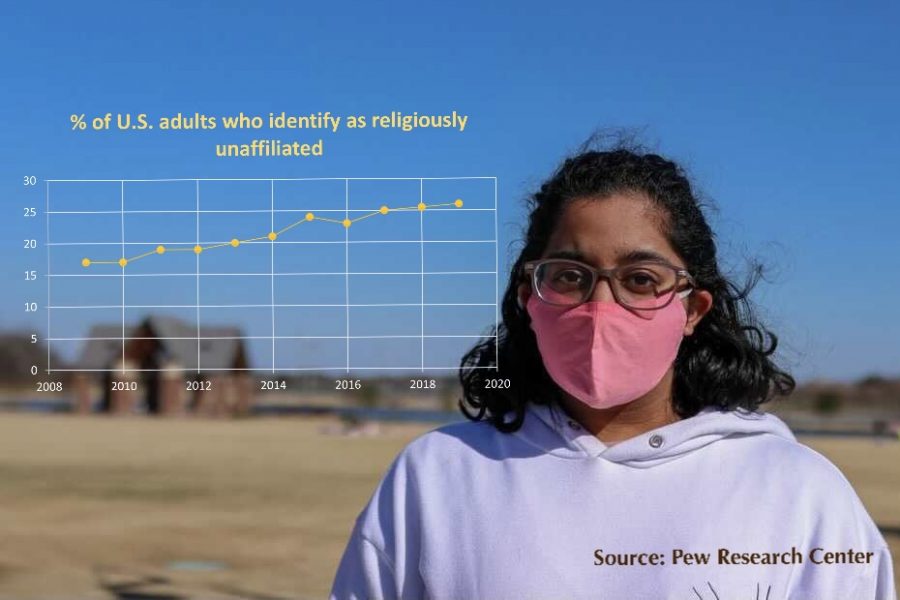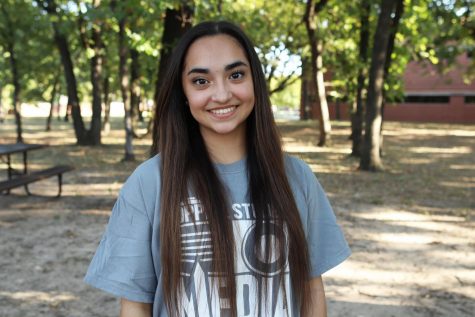Atheism is not amoral
The percentage of religiously unaffiliated people in the United States has increased from 17% to 26% in 10 years. The Sidekick advertising and circulation manager Trisha Atluri believes that there is a negative stigma around atheism that should be removed.
February 4, 2021
Hands clasped and kneeling in front of an idol of the Hindu god, Krishna, I refused to pray.
It wasn’t an act of rebellion, like my parents believed. Nor was it a phase. It was the result of years of questioning my view of religion until I realized I don’t believe in any gods, and thus, there is no point in worshipping them. So instead, as I waited for the procession to move on to the next idol, I focused my thoughts elsewhere.
I was born Hindu, but religion was never a big part of my life, as my parents rarely found time to celebrate holidays or go to temple. To me, religion is a connection to my family. From time to time, I participate in traditionally Hindu ceremonies to feel closer to my late grandmother.
But one nonbeliever’s journey does not define them all.
Atheists do not share a single commonality other than their lack of religion, so making generalized statements about them will inevitably misrepresent them. Some are spiritual, some are not. Some take part in cultural traditions from other religions, and some do not. Making an assumption about all atheists is akin to stereotyping all theists.
Moreover, these generalizations hinder the progress this country is making toward religious equality. Specifically, the popular belief that non-religious people do not have morals.
Religious texts often outline morals that define how believers should live. For example, Christianity has the Ten Commandments in the Bible and Islam has the Five Pillars of Islam in the Quran. While the existence of religious moral codes should not mean people who don’t subscribe to a religion lack morals, that is the assumption many operate under.
Why do nonbelievers appear as a threat? What is so dangerous about our lack of belief that it makes us seem so criminal?
“When you tell people you’re atheist, most of the time, they think you don’t have morals or you’re doing it to rebel against your parents and that isn’t the case,” Coppell High School junior Shreya Premkumar said. “Many people believe in order to be a good person or to have a purpose in life, you need to be religious, when that’s not true.”
The assumption that belief in God equates to strong moral principles is one whose roots lie in the age of McCarthyism. During the Second Red Scare in the 1940s and 1950s, Sen. Joseph McCarthy used the prevailing distress over communism to push the narrative that atheists were amoral, often referring to atheism as “communistic.”
As the fear of communism lies as a dormant yet powerful sentiment in America today, so does the stigma against atheists. Unfortunately, this unwarranted conclusion has branded nonbelievers in a way that limits society from accepting everyone, regardless of faith.
So, what is the solution? We must destigmatize atheism by examining the relevance religion holds for all people.
The prevalence of religion in the United States is not inherently bad, but the infiltration of Christianity into facets of life that affect everyone, even non-Christians, is problematic. In 2010, the Texas State Board of Education ruled that social studies classrooms must teach democracy as a result of Judeo-Christian values and the Constitution as largely based on the Bible, despite the general agreement by experts that ancient Greek and Enlightenment principles had a bigger role in the formation of the American government.
Not only is education tied to religion, but so are political issues.
“Most of the time, the views of certain political parties are based on what their religion tells them,” Premkumar said. “Their religion’s stance is in turn translated into what I’m allowed to do.”
To many, not believing in a higher power is a blasphemous concept. To some, it’s so hard to comprehend atheists exist that they deny our existence entirely.
“In Christianity, especially in the more extreme sects, there tends to be the practice of shunning,” an anonymous CHS junior said. “This is something I’m genuinely scared of from a lot of my family members, and that’s just a fact of life for me. You learn to shut up about it, and you live with it.”
No one should have to go through that level of discrimination, yet we are nowhere closer now than at the start of the century to achieving religious equality. It is not until religion, or the lack thereof, ceases to be a basis for judgement that we can destigmatize atheism entirely.
Follow Trisha (@trishatluri) and @CHSCampusNews on Twitter.













Victoria Hertel • Feb 10, 2021 at 7:32 pm
I always love hearing your stories Trisha. This was a great read! I liked the poll as well.